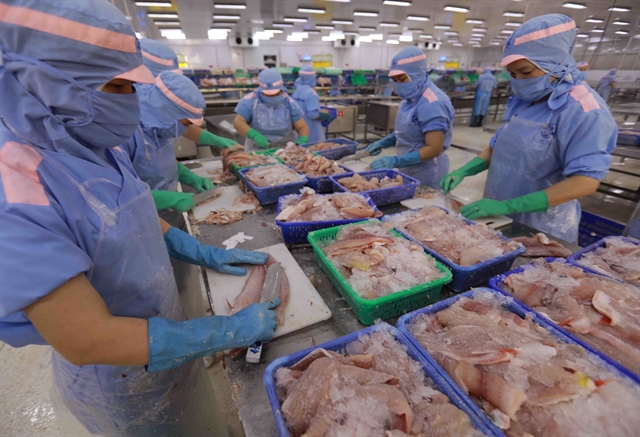 Economy
Economy


|
| Processing tra catfish fillets for export at the Cửu Long An Giang Seafood Import-Export JSC in the Mekong Delta province of An Giang. — VNA/VNS Photo Vũ Sinh |
HÀ NỘI — Việt Nam’s tra fish exports to the US are expecting a better outlook in the remaining months of this year after receiving some good news.
In early September, the US Department of Commerce (DOC) lowered anti-dumping duties on frozen tra fish fillets from Việt Nam following its latest preliminary conclusion.
The Federal Register, the daily journal of the US government, published the preliminary results of the 19th anti-dumping duty administrative review (POR19) by DOC on Việt Nam’s frozen tra fish fillets exported to the US for the period of August 1, 2021 to July 31, 2022.
Accordingly, the US authority determined that two Vietnamese companies, Vĩnh Hoàn Corporation and Cần Thơ Import Export Seafood Joint Stock Company (Caseamex), which were selected for individual examination as mandatory respondents, will enjoy a tax rate of zero US dollars per kilo and US$0.14 per kilo, respectively.
A rate of $0.14 per kilo will be applied to other companies including Cafatex Corporation, International Development and Investment Corporation, Lộc Kim Chi Seafood Joint Stock Company, and Hùng Vương Corporation.
The preliminary tax rate given at the POR19 has decreased from the final results of the previous review.
In August this year, the US Food Safety and Inspection Service (FSIS) conducted a thorough review of the food hygiene and safety management system pertaining to Vietnamese tra fish exports to the US.
The review focused on key components to determine the system’s equivalence.
According to Deputy Minister of Agriculture and Rural Development Phùng Đức Tiến, the initial findings of the inspection have garnered favourable responses from US authorities, with only minor technical discrepancies detected at some farms and businesses.
Such results are excellent for Việt Nam’s tra fish industry in particular and its agriculture in general, Tiến said.
Experts predict that the positive results of POR19, combined with the FSIS’s review and market factors such as increasing consumer demand during the year-end holiday season and decreasing inventories, will positively affect the fish export of Việt Nam to the US in the final months of the year.
According to the Vietnam Association of Seafood Exporters and Producers (VASEP), as of August 15, Việt Nam had shipped $169 million worth of tra fish to the US, down 59 per cent year on year.
It said the US was the largest tra fish importer from Việt Nam in 2015 and 2016. Since 2019, it has fallen to the second position after China, consuming about 22 per cent of the product.
Việt Nam mainly exports frozen tra fish fillets to the US, along with frozen pieces/cuts, frozen breaded, dried puffed, and fried skin products from tra fish.
However, in the first half of this year, due to the economic crisis and high inventory, Việt Nam’s tra fish exports to this market slowed down. — VNS